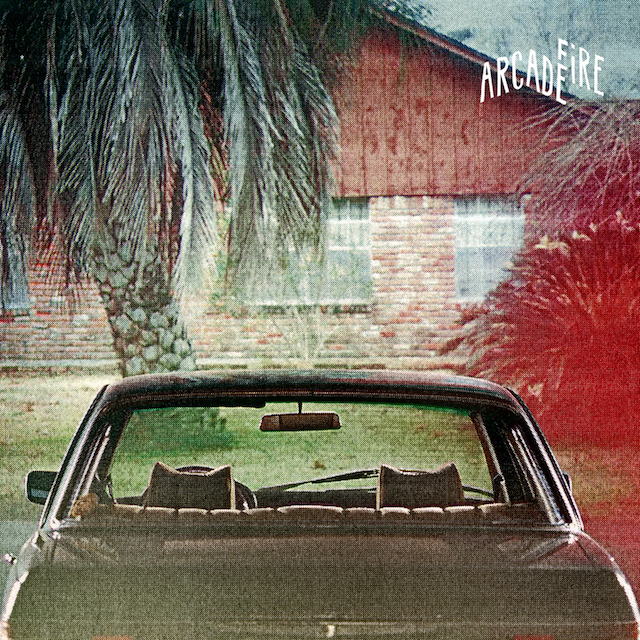Release Date: August 03, 2010
Label: Merge
On an album full of moments when hope turns haunting, the ghosts hang heaviest on the spellbinding “Suburban War,” which comes roughly halfway through Arcade Fire’s blazingly intense third album. Against solemn ringing guitar, Win Butler sings about a man remembering an old friend. Once, the two grew their hair long and vowed to escape, past the fences and pavement, to a place where they could battle on behalf of what was pure. Years pass in a shiver of violin and piano, and now they find themselves fighting different wars. The old friend cuts his hair, then disappears. A martial beat pounds. Butler’s voice trembles, the song steels itself in double-time, and the man peers into the window of every passing car, looking for his old friend’s face, doomed to seek a lost connection. Two lives become shining beacons, distant stars.
If Arcade Fire’s ragtag debut, Funeral, found its ecstatic force by celebrating the elusive comforts of community (hence four songs with the word neighborhood in the title), and 2007’s aggrieved, galvanizing Neon Bible powered forth in opposition to the hollow sparkle of church, state, and celebrity, then the harder, denser The Suburbs burns on behalf of the belief that modern culture is missing its heart — and to give up the search is to send one’s soul to oblivion.
Or, in Suburbs speak, to the Sprawl, where everything is connected but nothing ever touches. The deceptively easygoing title track opens things on a bouncy base of acoustic guitar and piano, as Butler, his resolute howl shaded with emotions absent from his younger self’s wounded yelp, struggles against self-doubt (“Sometimes I can’t believe it / I’m moving past the feeling”) and the suspicious, show-me stance of the kids who wanna be so hard.
Those kids return as cynical art schoolers in “Ready to Start,” warning Butler that businessmen will drink his blood, their own vampirism made seductive by a throbbing, death-wish bass line and rush of clanging guitar. Things downshift on the third track, “Modern Man,” a gentle folk-rock ramble outfitted with glassy keyboard shudders that gradually evolve into majestic arabesques on the subsequent “Rococo,” where modern kids build things up just to burn them down and the world crumbles in a craggy guitar solo.
This is a bigger, more byzantine Arcade Fire. Words that serve as master keys in one lyric become hushed whispers in another. Looped sounds of lonely traffic and needles stuck in endless grooves act as segues. “Jumping Jack Flash” echoes in the clarion-call guitars of “City With No Children” while the rapturous “Half Light II (No Celebration)” resounds with “Baba O’Riley” piano chords. Safety-pin punk and campfire folk share space on the punch-caress combo of “Month of May” and “Wasted Hours.” Butler’s consumptive croon in “Sprawl I (Flatland)” is rejuvenated by Régine Chassagne’s seraphic wail on “Sprawl II (Mountains Beyond Mountains).” There are no wrong turns.
Radiant with apocalyptic tension and grasping to sustain real bonds, The Suburbs extends hungrily outward, recalling the dystopic miasma of William Gibson’s sci-fi novels and Sonic Youth’s guitar odysseys. Desperate to elude its own corrosive dread, it keeps moving, asking, looking, and making the promise that hope isn’t just another spiritual cul-de-sac. After all, you never know who might be coming in the next car.





